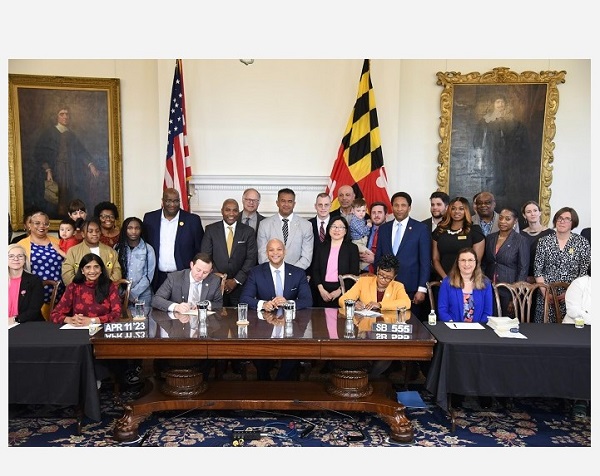ANNAPOLIS, MD—Governor Wes Moore on Tuesday presided over the Moore-Miller Administration’s first bill signing, dedicated to ending child poverty in Maryland. Governor Moore signed both the Fair Wage Act of 2023 and the Family Prosperity Act of 2023 into law during the first signing session in a series that will span the coming weeks.
“I entered office saying that this administration would launch the most aggressive, the most strategic, bipartisan, all-out assault on child poverty this state has ever seen,” said Gov. Moore. “I am proud because this session showed that we can move differently. It showed we can move in partnership. And it showed that once again, Maryland can do big things, and Maryland can lead.”
“This legislative agenda makes good on the promise our administration made to leave no Marylander behind,” said Lt. Gov. Aruna Miller. “Beginning with putting Maryland on a path to end child poverty, the results of this historically successful session demonstrate the positive impact of working collaboratively to get things done for Marylanders.”
The governor’s first bill signing is the culmination of one of the most productive legislative sessions for any first-year administration in Maryland’s history and is the result of focused collaboration, teamwork, and partnership with the Maryland General Assembly. As a result, all ten of the bills that Governor Moore authored in his first legislative session passed with bipartisan support.
Included among Governor Moore’s champion pieces of legislation signed today are:
The Fair Wage Act of 2023, which raises the minimum wage in Maryland effective January 1, 2024. The acceleration brings the minimum wage up to $15 an hour two years ahead of schedule and will increase wages for approximately 163,000 workers, benefitting 120,000 children in Maryland.
Family Prosperity Act of 2023, which will lift at least 34,000 Maryland children to the next rung on the economic ladder and combat the root causes of child poverty through two primary means:
- Permanently extending the Earned Income Tax Credit created by the legislature during the 2020 legislative session and removing the $530 cap for adults without qualifying children;
- Expanding the Child Tax Credit to cover all taxpayers who have children aged six and under who have a federally adjusted gross income of $15,000 or less (up from $6,000); the expansion makes all children under age six eligible while retaining credit for children over age six who are living with disabilities.
The expansion of the Child Tax Credit will benefit an estimated 40,000 taxpayers, while the expansion and permanent extension of the Earned Income Tax Credit will provide much-needed relief for as many as 400,000 Marylanders. The action is part of nearly $200 million reserved for tax relief as proposed by Governor Moore, including funding for the Earned Income Tax Credit, the Child Tax Credit, and new tax cuts for veterans.
Governor Moore also signed into law the Child Victims Act of 2023, which removes the statute of limitations on civil lawsuits against sexual abusers, helping to bridge the gap between justice and our legal system. The bill signing comes less than a week after Maryland Attorney General Anthony G. Brown released a harrowing 500-page report outlining how 156 members of the Catholic church in Baltimore abused and tormented more than 600 children and young adults over the course of decades and the systemic corruption that enabled years of continued abuse.
The complete list of bills signed into law is available online here.
Do you value local journalism? Support NottinghamMD.com today.

